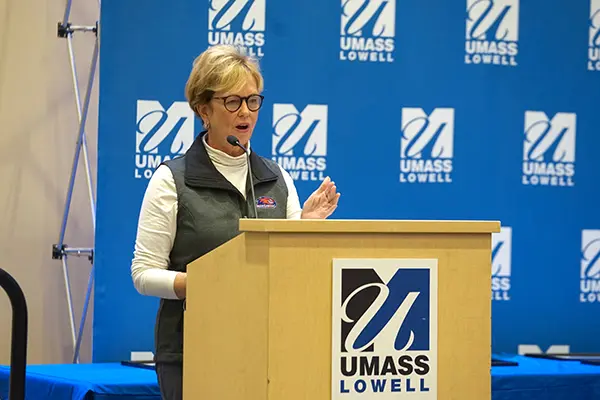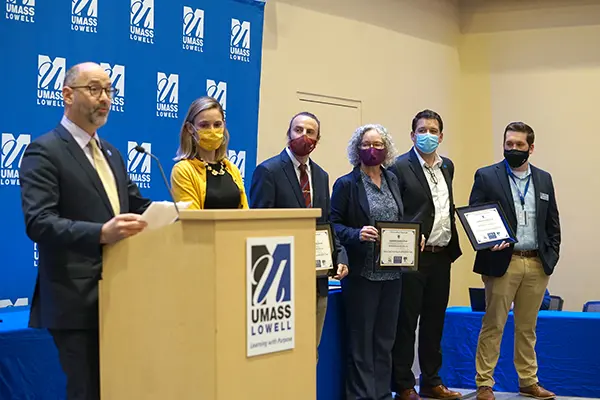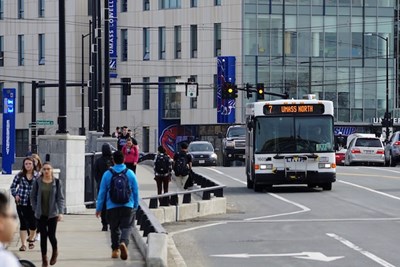Commonwealth Commends Collaboration with 3 Other Campuses
 Image by Ed Brennen
Image by Ed Brennen
Secretary for Energy and Environmental Affairs Kathleen Theoharides, third from left, poses with UMass Lowell's, from left, Dan Abrahamson, Ruairi O'Mahony, Julie Chen, Steve O'Riordan, Thomas Miliano and T.J. McCarthy at the Leading by Example awards at University Crossing.
12/15/2021
By Ed Brennen
“That’s perfect,” she said. “That’s exactly the kind of engine of hope we want our universities to be as we pursue the challenge of climate change.”
UMass Lowell received a Leading by Example award for its collaborative efforts with fellow honorees UMass Amherst, UMass Dartmouth and Salem State University over the past year to decarbonize each campus — one of eight awards handed out at the recent ceremony at University Crossing’s Moloney Hall.
Now in their 15th year, Leading by Example awards recognize commonwealth agencies, municipalities, and public colleges and universities for outstanding efforts related to clean energy and the environment.
UMass Lowell recently completed an 18-month decarbonization study that was funded by a $100,000 grant from the Department of Energy Resources. The study resulted in a renewable energy master plan that lays out a comprehensive and strategic approach to campus projects that meet future energy demands while also helping the university achieve carbon neutrality by 2050.
As part of the process, a decarbonization planning team from UML — made up of representatives from Facilities Management, the Rist Institute for Sustainability & Energy and the executive cabinet — met quarterly with similar teams from the three other campuses to share best practices, resources and lessons that can be applied at other state facilities.
 Image by Ed Brennen
Image by Ed Brennen
Chancellor Jacquie Moloney sees UML's sustainability and renewable energy efforts as one of her "greatest legacies" at the university.
“It’s been a snowball effect. UMass Amherst started it, and we took lessons learned and kept going with it,” said UML Energy Manager Dan Abrahamson, a member of the planning team. “Each campus is a little different, but we all have the same goal: to shave carbon.”
Based on the decarbonization roadmaps laid out by the four campuses, Abrahamson said UMass Boston is now pursuing its own alternative energy master plan “that hopefully will be even better than ours.”
Theoharides noted that the four campuses collectively account for 33% of natural gas consumption and 20% of greenhouse gas emissions by state agencies annually.
“That means the way these campuses develop and enact energy policy can have a real impact on our state government’s energy usage,” she said.
The four campuses have made “tremendous progress” in reducing their collective greenhouse gas emissions by 37% since 2004 by adopting innovative technologies, Theoharides added. She pointed to the installation of 7.2 megawatts of solar, the addition of 100 electric vehicle charging stations, the opening of 30 LEED-certified buildings and, at UML, the addition of Grind2Energy food waste recycling systems that convert food scraps into renewable energy.
 Image by Ed Brennen
Image by Ed Brennen
UML Director of Sustainability Ruairi O'Mahony, second from right, and Energy Manager Dan Abrahamson, right, join representatives from UMass Dartmouth, UMass Amherst and Salem State University on stage to accept their Leading by Example award.
“But there’s still much more work to do,” she said.
Department of Energy Resources Commissioner Patrick Woodcock commended UML for its “incredible mixture of entrepreneurship, innovation and tangible climate action” to not only reduce its own emissions, but to also serve as a model that can spread “to community, to state and to country.”
Chancellor Jacquie Moloney, who is retiring at the end of the academic year, said she considers UML’s sustainability and energy efforts “one of my greatest legacies” at the university.
She said the commonwealth “couldn’t have picked a more appropriate place to host these awards, given UMass Lowell’s broad and partnership-focused approach” to addressing the issues. She highlighted the university’s collaboration with Lowell-based urban farming nonprofit Mill City Grows, the Lowell Green Community Partnership and the important work of UML researchers.
“In the last three years, our talented faculty have brought in almost $40 million in funding focused on climate change, energy and sustainability,” Moloney said. “As our expertise grows, so does the sense of urgency. It’s not a task for any one organization, one industry, or one profession; it is an imperative that we collaborate and coordinate on to realize our collective goals.”




